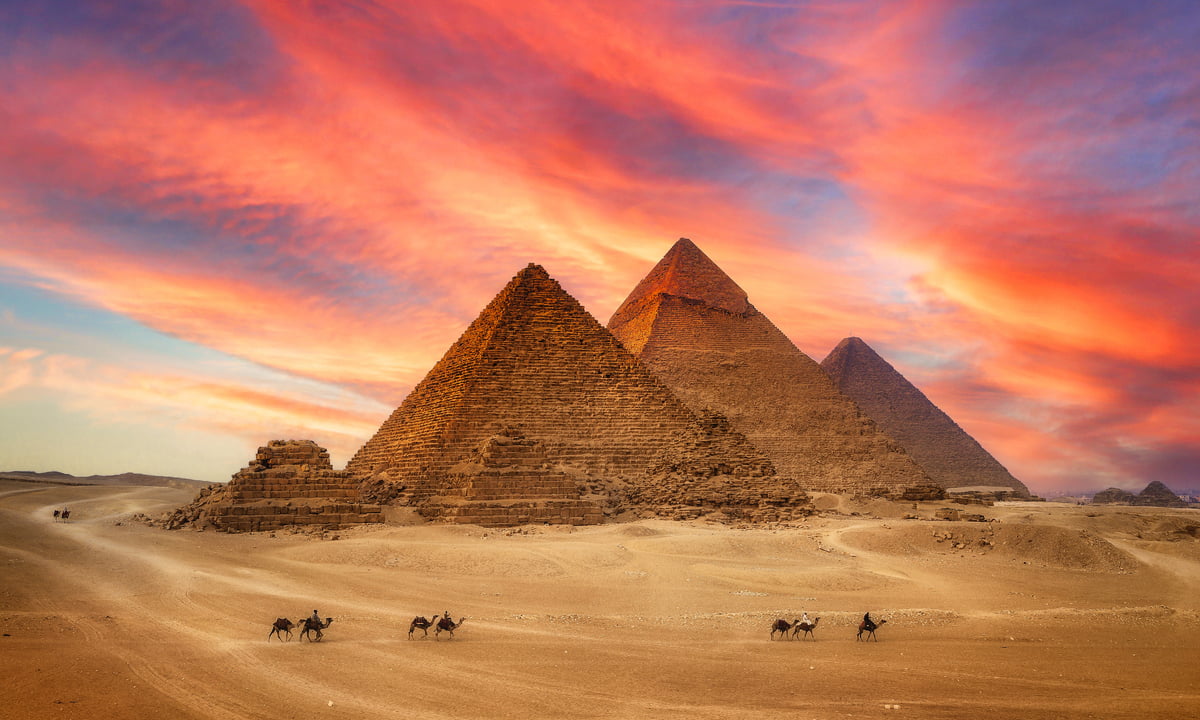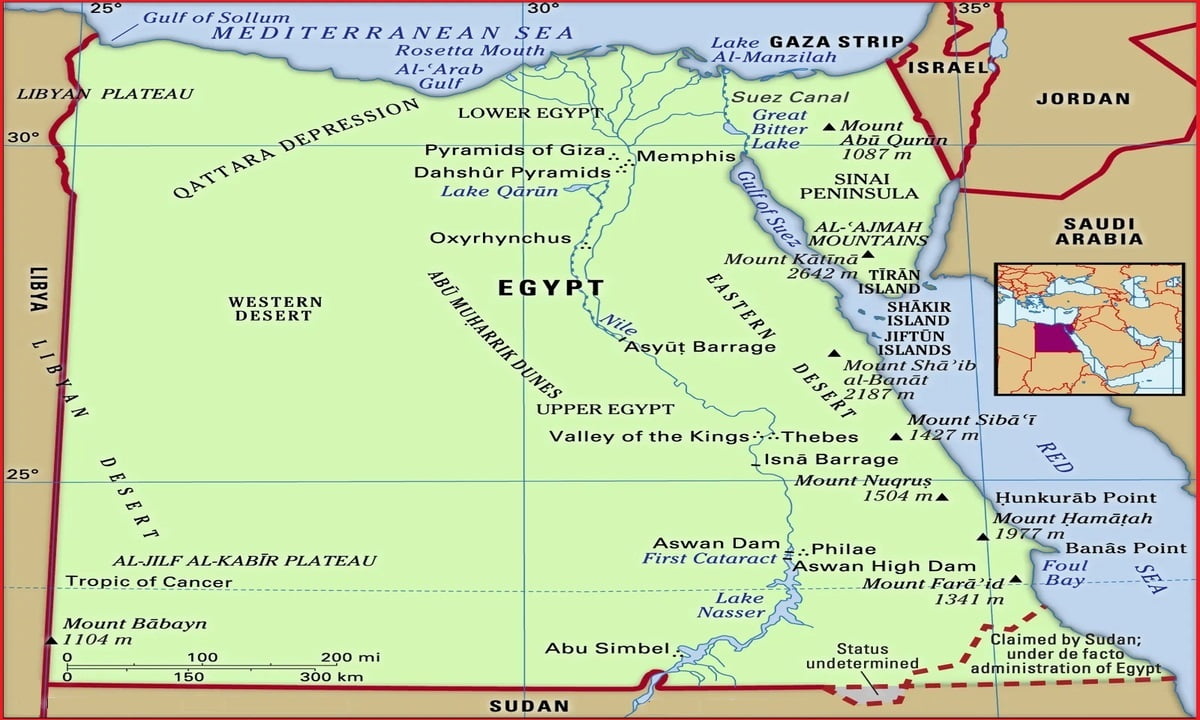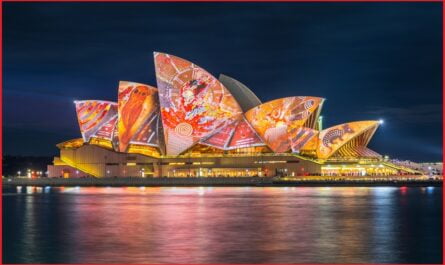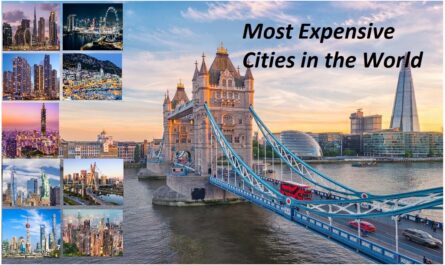Egypt, country in the northeast corner of Africa. The heartland of Egypt, the Nile Valley and Delta, was home to one of the important civilizations of the ancient Near East. Pharaonic Egypt flourished for about 3,000 years through a series of indigenous dynasties punctuated by brief periods of foreign rule. After Alexander the Great’s conquest of the region in 323 B.C., urban Egypt became an integral part of the Hellenistic world.
History
The first people to live on the banks of the Nile were hunters and fishermen who settled there more than 8,000 years ago. They learned to grow crops and raise animals, and they began to build villages and cities. They traded with their neighbors and learned to sail boats. By 3000 BC, a civilization had emerged.
Around 3100 BC, the kingdoms of Upper and Lower Egypt united under a powerful king, later called Pharaoh. These kings built huge pyramids, temples and other monuments.
By 1000 BC, Egypt had fragmented into smaller parts, and the empire was in decline. Strong neighbors attacked and took over Egyptian territory. In 31 BC, Egypt fell under Roman control. In 640 AD, Muslim warriors took over Egypt and founded the modern capital city of Cairo. They ruled for several centuries. In the 16th century, Egypt became part of the Ottoman Turkish Empire.
European powers played an increasing role in Egypt in the 18th century. The British invaded and occupied Egypt in 1882. The British wanted control of the Suez Canal, which connected the Mediterranean Sea with the Red Sea and greatly shortened the sea voyage from Asia to Europe. Egypt gained full independence from Britain in 1952 and took control of the Suez Canal in 1956. Neighboring Arab countries and Egypt engaged in a series of wars with the Jewish state of Israel until the 1970s. Egypt and Israel signed a peace agreement in 1979. A popular uprising toppled Egypt’s longtime president, Hosni Mubarak in 2011. Since 2011, the country has held several democratic elections, but the military’s role in government remains strong.
Nature
Egypt is home to a wide variety of plants and animals, including Gazelles, Jackals, Cobras and Crocodiles. The best places to observe Egypt’s wildlife are the more than 20 protected areas, which include oases, deserts, coastal areas, mountains, wetlands, and river islands. The Egyptians have always been very close to nature. The ancient Egyptians left paintings and carvings of large animals such as hippos, leopards, elephants, and cheetahs. These animals were once common in Egypt, but are now rare or extinct due to hunting and habitat loss.
People and Culture
The majority of the population is ethnically Arab, and Islam is the predominant religion, with the majority being Sunni Muslims. Egypt’s cultural heritage is celebrated worldwide, with its iconic ancient monuments such as the Sphinx and the Pyramids of Giza, as well as the historic city of Luxor. Egyptians are known for their warm hospitality and strong sense of community, with family playing a central role in their lives. Traditional Egyptian cuisine is known for its tasty dishes such as koshari, kebabs and falafel.
Dance, Art, and music are integral parts of Egyptian culture, with Arabic music and belly dancing making a notable contribution to world culture. In addition, Egypt has a rich literary tradition, and its history of cinema has made it a major player in the Middle Eastern film industry.

Languages
Egypt is primarily an Arabic-speaking country, where Modern Standard Arabic (MSA) is used as the official language in government, education, and the media. However, Egyptian Arabic, a distinct dialect, is the most commonly spoken language in daily life. Other languages are spoken in Egypt, reflecting the country’s diverse cultural heritage. English and French are taught in schools and used in business and diplomatic circles. Coptic, an ancient language, is used in religious contexts by the Coptic Orthodox Christian community.
Nubian languages are spoken in the southern regions, and various Bedouin dialects are found among the nomadic tribes. In the Western Desert and the Sinai Peninsula there are communities speaking Amazigh and other indigenous languages. Egypt’s linguistic diversity is a testament to its rich history and the presence of diverse ethnic and cultural groups throughout the country.
Education
Egypt’s education system includes preschool, primary, preparatory, and secondary education. Higher education includes a variety of universities and institutions offering different degrees. The government is implementing reforms to increase quality, improve access, and align education with workforce needs. Challenges include overcrowded classrooms, lack of resources, and income inequality.
Geography
Without the Nile River, all of Egypt would be a desert. In all of Egypt, only about an inch of rain falls each year. But every summer, the river rises at its source far to the south in Ethiopia because of the rains. Floods cover river valleys, leaving sediments needed for the growth of plants, crops and trees.
Egypt is often divided into two parts, Lower Egypt in the north and Upper Egypt in the south. The sections are so named because the Nile flows from south to north. The river flows into the Mediterranean Sea. The landscape in southern Egypt consists of low mountains and desert. The north of Egypt consists of wide valleys near the Nile and desert to the east and west. North of the capital Cairo is the vast, triangular Nile Delta. This fertile land is completely covered with farms.

Transportation
Transportation and telecommunications play a crucial role in Egypt’s economy and daily life. Egypt has an extensive road network connecting major cities and regions. The road network includes highways and local roads are well maintained. The Egyptian National Railway operates an extensive rail network that connects the major cities and municipalities. In cities like Alexandria and Cairo, public transportation includes buses and an expanding metro system. The Cairo Metro is the first of its kind in Africa and one of the busiest in the world. Egypt has several international airports, with Cairo International Airport being the largest and busiest. It serves as a hub for domestic and international flights.
Government and Economy
Due to its geographical location, population, history and military strength, Egypt has become very influential in the region. Egypt is a democratic republic, although some critics claim it is not truly democratic. Until 2005, there was never more than one presidential candidate to vote for. In addition to gas and oil exports, the tourism industry remains an important part of the Egyptian economy. Visitors flock to the country to see ancient monuments like the Great Pyramids and the Sphinx. And to learn about ancient Egyptian rulers like King Tutankhamun.
Health and welfare
Egypt has a mixed health care system consisting of both public and private facilities. Public hospitals and clinics serve a large portion of the population, while private health care is available to those who can afford it. Egypt does have health insurance, but it is not universal. Many Egyptians rely on the government insurance system, but there is also a growing market for private health insurance.
Egypt has several social assistance programs to support needy populations. These include cash transfer programs and food subsidies. The Takaful and Karama programs, for example, target low-income families and individuals. Egypt has a social security system that provides pensions and other benefits for retired workers. The Egyptian government strives to balance economic development with meeting the social and health needs of its diverse population.
Sports
The sports culture of modern Egypt has its roots in ancient Egypt, where weightlifting, stick fencing, wrestling and ball games were practiced for physical training and entertainment. The 1952 revolution led to unprecedented government investment in sports infrastructure for schools, training institutes, universities and clubs to develop the country’s international status.
Since the early 1980s, basketball has grown in popularity in Egypt thanks to the success of the men’s national team, which won the African Championship in 1983. Volleyball is another team sport that enjoys a large following, and various martial arts are popular individual sports. Football, however, remains the most popular sport in the country.
Conclusion
Egypt is a country with a multi-faceted history spanning thousands of years and is famous for its ancient civilization, the pyramids and the pharaohs. Over the centuries, it has witnessed the rise and fall of powerful dynasties, interaction with different cultures, and significant contributions to human civilization. Its history also includes periods of foreign domination and struggles for independence that led to the modern Egyptian state. Today, Egypt is a diverse and dynamic country with a mix of ancient heritage and modern aspirations, offering a complex and fascinating history of its place in the Middle East and the world.




